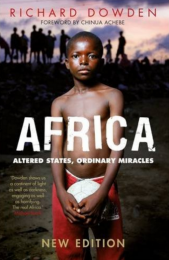 Here is a book to request as a Christmas present!
Here is a book to request as a Christmas present!
It would be naïve to think of ‘African culture’ as homogeneous. Nevertheless, in this substantial book (600+ pages) Richard Dowden, former Africa editor for the Economist, draws from three decades of personal experience to examine several cultural issues which are manifest in many African countries in a way that I found enlightening. He then considers specifics related to fourteen nations from different parts of the continent.
Maps
To remind the reader of the size of Africa the first few pages show diagrams with substantial nations – The United States of America, China, India – superimposed on the outline of Africa. Each seems relatively small compared to Africa and these serve as a reminder of the danger of over simplification when trying to understand the African continent, which embraces 54 nations. (As an aside, you may like to follow this link for an interesting presentation of similar data).
Culture
Through the book the author alludes to many examples of cultural issues, particularly those which differ from the Western mind-set. It is helpful to realise that there are no right/wrong stances on many cultural issues; they just differ. So it is important to read this book with an enquiring mind. Let’s touch on a few examples.
Family life
The concept of the nuclear family is foreign to the practice of much of African culture where the extended family is normal. In addition to the biological parents others are often involved in a child’s up-bringing who may have as much influence as the mother and father; parents’ siblings, grand-parents etc. Life is lived very openly; ‘private space’ is a western concept.
Finance and material goods
The visitor may be offended by open requests for money or goods – even interpreted as begging – but this is the norm in many African cultures.
Democracy
Most African nations have a President, a post that was first established when independence from a colonial power was granted. Yet to vote him (or occasionally her) out of office after, perhaps, two terms of five years is foreign to an African mind-set. The Big Man is not for voting in and out; he has status that puts him above popular will. Dowden also shows how the relationship with the former colonising nation may operate.
Nations
When considering specific nations Dowden masterfully guides us through the historical and political issues most prevalent in each, not always being complimentary to the former colonial power. The nations he considers in some detail are Uganda, Somalia, Zimbabwe, Sudan, Angola, Burundi, Rwanda, Senegal, Sierra Leone, Congo, South Africa, Kenya, Nigeria, Ethiopia. These overviews do, themselves, cause the reader to realise the widely differing nature of African nations, and their cultures and practices.
Other issues
What about the effects of AIDS? Where does China fit into Africa’s future? How do aid agencies cope in conflict areas? What is the impact of Islam? What is the future for Africa? The early euphoria after independence often gave way to incompetent military rule and economic decline in many nations. And yet there is an African optimism that does not easily get suppressed. Is that optimism well-founded? You will have to read Africa – Altered states, ordinary miracles to find the author’s view!
